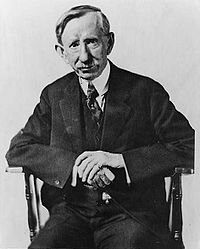1521: The Filipinos return to Homonhon, an island in the province of Eastern Samar on the west side of Leyte Gulf witch is about 20 km long. bringing with them two boats heavily laden with coconuts, oranges, palm wine, and a rooster. Accompanying the Filipinos is their chieftain. His face is tattooed and he wears gold earrings and bracelets and a cotton skirt hemmed with silk tassels. His weapons are made of bronze generously mixed with tin alloys. His shield, javelin, and dagger are laid with gold. His appearance convinces the Spaniards that the Filipinos have attained a considerable degree of civilization and much wealth.
1863: Birth of Mariano Ponce in Baliwag, Bulacan where he completed his primary education. He later enrolled at the Colegio de San Juan de Letran and took up medicine at the University of Santo Tomas. In 1881, he traveled to Spain to continue his medical studies at the Unversidad Central de Madrid. Mariano Ponce was a Filipino physician who was one of the leaders of the Propaganda Movement, that founded the Philippine Revolution. He died on May 23, 1918.
1869: Birth of Emilio Aguinaldo. Emilio was a Filipino general, politician, and independence leader of Chinese and Spanish descent. He played an instrumental role in Philippine independence during the Philippine Revolution against Spain and the Philippine-American War that resisted American occupation. He eventually pledged his allegiance to the US government. Aguinaldo is considered to be the country's first and the youngest Philippine President and also the longest living Philippine President. Died on February 6, 1964.
1897: The Tejeros Convention proclaims the Republic of the Philippines. The newly elected officials are Emilio Aguinaldo, President; Mariano Trias, Vice-President; Artemio Ricarte, Captain-General; Emilio Riego de Dios, Director of War; and Andres Bonifacio, Director of the Interior.
1901: General Leandro Fullon surrenders to Major Scott of the United States Army, through the mediation of General Delgado, Cornelio Meliza, and others.
1915: Frank W. Carpenter, governor of Mindanao, negotiates a formal agreement with Jamalul Kiram II, Sultan of Jolo, whereby the latter gives up his political right as ruler and retains only his position as spiritual head of the Muslims. In return, the Sultan is granted an annual pension of P12,000 and some lands in Jolo. The abolition of the Sultanate does not do away with Sultan’s line of succession.





